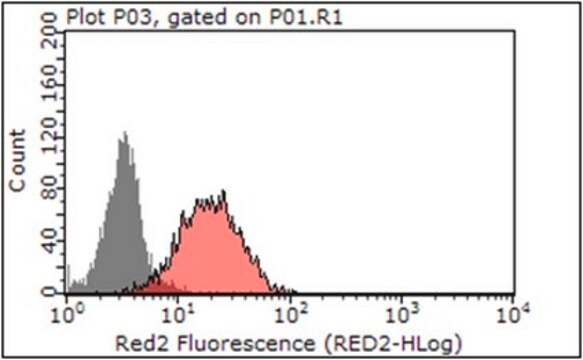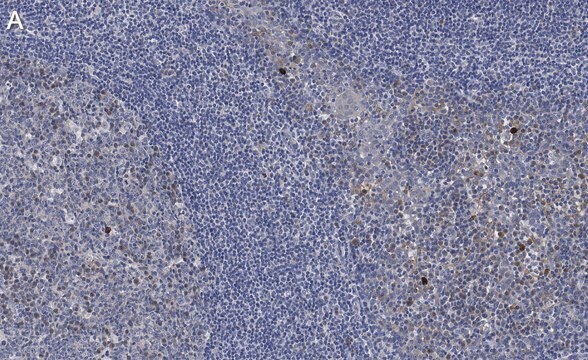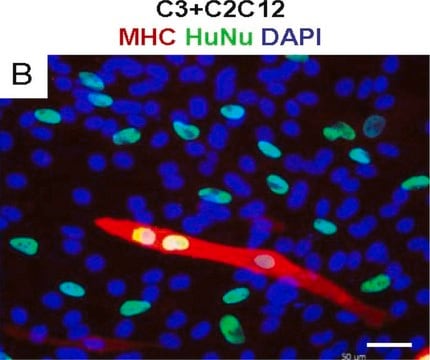SBAT06
BCRP human
membrane preparation for ATPase Assays, recombinant, expressed in baculovirus infected Sf9 cells
Synonym(s):
ABCG2, Breast Cancer Resistance Protein
Sign Into View Organizational & Contract Pricing
All Photos(1)
About This Item
UNSPSC Code:
12352202
Recommended Products
recombinant
expressed in baculovirus infected Sf9 cells
form
liquid
concentration
5 mg/mL
color
off-white
UniProt accession no.
shipped in
dry ice
storage temp.
−70°C
Gene Information
human ... ABCG2(9429)
General description
Membrane Preparations for ATPase Assays are suitable for drug-efflux transporter interaction studies based on ATPase activity determination, and could be used for differentiation between transporter substrates and inhibitors.
Application
The ATPase assay is an in vitro membrane assay designed to indicate the nature of the interaction between the compound and the transporter. By measuring ATPase activity, both activation and inhibition of transporters can be investigated using membranes from baculovirus-infected insect cells or mammalian cell membranes containing high levels of human or rodent wild-type transporters. ABC transporters mediate the transport of substrates against a concentration gradient using energy derived from ATP hydrolysis, which is proportional to the transporter activity and could easily be detected with a colorimetric method.
To assess activation, ABC transporter-rich membranes are incubated with various (typically in 8) concentrations of the test article and the effect on basal ATPase activity is measured. Compounds that stimulate ATPase are generally considered substrates for the transporter. To assess inhibition, a test article′ ability to modify the activity of a given ABC transporter stimulated with its prototypical substrates is examined. The activation and inhibition tests are complementary assays.
Stimulation detected in the activation assay indicate that the compound is a transported substrate of the transporter, while interactions detected in the inhibition test indicate interaction of the test compounds with the transporter, but do not give information on the nature (substrate or inhibitor) of the interaction. In some cases inhibitors or slowly transported compounds may inhibit the baseline transporter ATPase activity as well.
Slowly transported substrates often do not stimulate the ATPase activity in a detectable extent; however the existing interaction can be identified in the inhibition assay.
To assess activation, ABC transporter-rich membranes are incubated with various (typically in 8) concentrations of the test article and the effect on basal ATPase activity is measured. Compounds that stimulate ATPase are generally considered substrates for the transporter. To assess inhibition, a test article′ ability to modify the activity of a given ABC transporter stimulated with its prototypical substrates is examined. The activation and inhibition tests are complementary assays.
Stimulation detected in the activation assay indicate that the compound is a transported substrate of the transporter, while interactions detected in the inhibition test indicate interaction of the test compounds with the transporter, but do not give information on the nature (substrate or inhibitor) of the interaction. In some cases inhibitors or slowly transported compounds may inhibit the baseline transporter ATPase activity as well.
Slowly transported substrates often do not stimulate the ATPase activity in a detectable extent; however the existing interaction can be identified in the inhibition assay.
Physical form
Supplied as frozen membrane vesicles, containing 5 mg/ml membrane protein, labeled with volume, catalog number (transporter) and date of production.
Legal Information
Distributed for SOLVO Biotechnology, Inc.
Storage Class Code
12 - Non Combustible Liquids
WGK
WGK 1
Flash Point(F)
Not applicable
Flash Point(C)
Not applicable
Choose from one of the most recent versions:
Certificates of Analysis (COA)
Lot/Batch Number
Sorry, we don't have COAs for this product available online at this time.
If you need assistance, please contact Customer Support.
Already Own This Product?
Find documentation for the products that you have recently purchased in the Document Library.
Our team of scientists has experience in all areas of research including Life Science, Material Science, Chemical Synthesis, Chromatography, Analytical and many others.
Contact Technical Service








